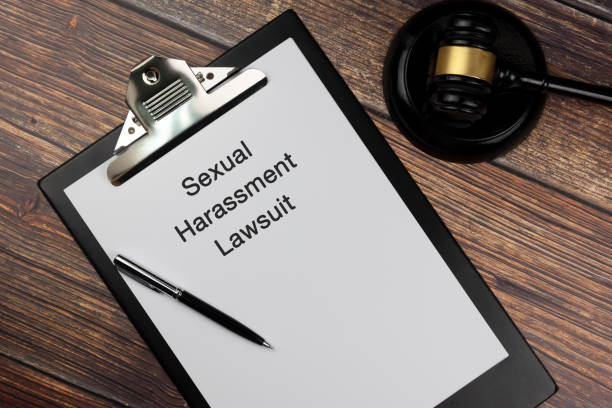
Fair work Stop Sexual Harassment Orders, How Will They Work? After years of campaigning by unions and gender equality advocates, the Federal Government has introduced a Bill to the Senate that aim to simplify and streamline sexual harassment legislation. These proposed amendments are in response to the Respect@Work Report (the Report) presented to the Government by the Sex Discrimination Commissioner, Kate Jenkins, in March last year.
Nevertheless, the Australian Council of Trade Unions (ACTU) has labelled the reforms a “missed opportunity” to deal with sexual harassment and violence at work. The ACTU have described the legislative proposals as falling short of protecting workers from sexual harassment and gendered violence at work as it will continue to place the burden on the shoulders of individual women to enter complex and lengthy complaints processes at their own cost and risk. The central theme of the Respect@Work Report Recommendations was to better integrate and align the anti-discrimination, workplace and WHS systems and put in place a proactive, preventative approach to sexual harassment.
What is sexual harassment?
Sexual harassment, as defined under federal and state anti-discrimination legislation, is unwanted or unwelcome sexual advances, requests for sexual favors or conduct of a sexual nature in circumstances which a reasonable person, having regard to all the circumstances, would have anticipated this behaviour to cause offense, humiliation or intimidation.
Fair work Stop Sexual Harassment Orders Reforms
The bill proposes changing the definition of “serious misconduct”, under the Fair Work Act 2009 (Cth), to include sexual harassment and making sexual harassment a valid reason for an employee to be terminated.
Additionally, the government will seek to change the Fair Work Act 2009 (Cth) to allow for urgent request for “stop sexual harassment” orders, by amending the existing regime that allows for “stop bullying” orders. Part 6 – 4B of the Fair Work Act 2009 (Cth), which deals with stop bullying orders, will be extended to allow a worker who has been sexually harassed (as defined in section 28A of the Sex Discrimination Act 1984) at work by one or more individuals to apply to the Fair Work Commission for an order to stop the sexual harassment.
The Bill also amends the Fair Work Act 2009 (Cth) to enable an employee to take compassionate leave if they, or their spouse or de facto partner, has a miscarriage. This amendment will promote women’s workforce participation and, more broadly, women’s economic security.

No Compensation for Sexual Harassment in FWC
Although the “Stop Sexual Harassment Order” is arguably a positive step in allowing the Fair work Commission to make orders to stop sexual harassment, it has a similar legislative framework to the application for an “Order to Stop Bullying”, meaning the remedies are limited. The order to stop sexual harassment will give the Fair Work Commission the power to make any order it considers appropriate, other than an order requiring payment of a pecuniary amount, to prevent a worker from being sexually harassed at work.
This is provided that the Fair work Commission is satisfied that sexual harassment has occurred and there is a risk the harassment will continue. Thus, the worker is able to seek a preventative remedy but not a remedial, punitive or compensatory remedy.
However, the legislation makes it clear that an order to stop sexual harassment can be made after just one instance of sexual harassment, as opposed to an order to stop bullying which, requires repeated unreasonable behaviour which causes a risk to the worker’s health and safety.
Aforementioned, the current legislation and proposed amendments, do not allow compensation to be sought for pain and suffering as a consequence of the sexual harassment endured.
The General Protections provisions under Part 3-1 of the Fair Work Act 2009 (Cth), prohibit employers from taking adverse action against an employee because of a workplace right or industrial activities and protects against discriminatory treatment on the basis of protected attributes and sham arrangements. A worker can lodge an F8C Application – General Protections Application not involving Dismissal – if the worker can establish that the adverse action they are experiencing is in response to a protected right or protected attribute. However, sexual harassment is not an explicit protection under the Fair Work Act 2009 (Cth) and so compensation cannot be sought under these provisions either.
Some employees have attempted to argue that sexual harassment is a protected attribute through sex discrimination. The courts have held that sexual harassment constitutes sex discrimination, which is a protected attribute, as the Applicant has been treated less favourably than her male colleagues in being sexually harassed.[1] Further, it has also been held that sexual harassment may be considered adverse action due to the Applicant being female and thus discriminated against on the basis of her sex.[2]
Nevertheless, the Fair Work Act 2009 (Cth) should be amended to expressly prohibit sexual harassment and adverse action should be defined to include sexual harassment as a form of discrimination against a person by reason of the person’s sex. This would reflect the decisions under common law.
Enacting such an express provision would provide greater protection against sexual harassment and give employees the right to seek monetary compensation for enduring sexual harassment in their employment, in the same way this can be sought through state and federal anti-discrimination laws.

Unaddressed Recommendations
Although Prime Minister Scott Morrison and Attorney-General Michaelia Cash stated that the government would accept all of the report’s 55 recommendations either “wholly, in part, or in principle” and introduce changes before the next budget, there were a number of important recommendations that were ignored:
- Recommendation 28 – Amend the FW Act to expressly prohibit sexual harassment and introduce a new quick and easy complaints process
- Recommendation 17 – Amend the Sex Discrimination Act to include a positive duty on employers to take reasonable measures to eliminate sex discrimination, sexual-harassment and victimisation.
- Recommendations 18 and 19 – Amend the Sex Discrimination Act to give the Sex Discrimination Commissioner the power to undertake systemic investigations (eg where there is a pattern of sexual-harassment in a sector or workplace) and undertake compliance monitoring to ensure that industries, organisations or sectors are complying with a new positive duty.
- Recommendation 23 – Amend the Australian Human Rights Commission Act to allow public interest actions to be brought to court by representative bodies such as unions.
- Recommendation 25 – Amend the Australian Human Rights Commission Act to ensure costs may only be ordered against a party if the proceedings are vexatious or unreasonable.
- Recommendation 15 – Ratify the International Labour Organization’s Convention on the Elimination of Violence and Harassment at Work 2019
ACTU’s President, Ms Michele O’Neil, made the following statement in response to the Bill:
“The Government’s ‘Roadmap to Respect’ released today fails to deliver on essential changes… Given the chance to do something real and significant, the Morrison Governments roadmap is stuck in the slow lane… They sat on this report for over 12 months, and having been shamed into actually responding, they have the ignored the most important recommendations of the report – recommendations that would have delivered real change at the workplace…The Sex Discrimination Commissioner’s report recommended changes to health and safety laws and the Fair Work Act to provide protections against sexual harassment, offer rights to women, and real responsibilities to employers for a safe workplace. The Government has left these recommendations on the table in favour of minor changes that will not deliver new rights to workers… Again, the Government has shown they cannot back their statements with real action… Education and awareness are important but unless they are backed up with rights and legal consequences, they fail the working women of Australia.”
ACTU President Ms Michele O’Neil
As Kate Jenkins puts it in her foreword to the Respect@Work report, “There is an urgency for change. There is the momentum for reform.” And this report is Australia’s answer to helping better tackle workplace sexual harassment and assault.

Fair work Stop Sexual Harassment Orders, How Will They Work
I hope the article has been helpful, informative. I have only commented on the current Federal approach to Sexual harassment, you still have considerable rights under the various state legislation, it can get complex, get advice, that’s what we are here for. its free, call 1800 333 666, we at A Whole New Approach are not sexual-harassment lawyers . We are the nations leading workplace advisors and have been representing employees in sexual-harassment and related discrimination matters since 2004. Every day we are in attendance at the Fair work Commission representing women in unfair dismissals, general protections and adverse action claims
[1] Birch v Wesco Electrics (1966) Pty Ltd (2012) 218 IR 67 [81]; Aldridge v Booth (1988) ALR 1 [16]-[17].
[2] Hall v A & A Sheiban Pty Ltd (1989) 20 FCR 217, 247.













